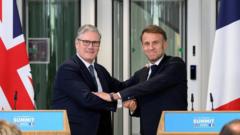Can Starmer and Macron Restore Patience in Today’s Fast-Paced World?

Understanding the Political Landscape: A Focus on Leadership, Challenges, and Opportunities
In today's fast-paced political environment, leaders find themselves under immense pressure. The recent news conference featuring French President Emmanuel Macron and UK Prime Minister Sir Keir Starmer exemplified this phenomenon. Both leaders are navigating turbulent waters, lacking support in opinion polls and contending with a rising tide of populism that threatens traditional political norms. This article delves into the complexities of their leadership, the challenges they face from competing parties, and the implications of their strategies for the future of governance in both countries.
The Context of Leadership Under Pressure
Leadership today is less about the authority of office and more about the ability to connect with the electorate. Macron and Starmer, while addressing the media, stood not just as representatives of their parties but as symbols of a broader struggle against rising populism. Their task is to articulate a vision of governance that embraces patience and nuance, qualities that seem to be diminishing in an age characterized by impatience and a hunger for instant solutions.
The Populist Challenge
In both France and the UK, parties like Reform UK and National Rally have emerged as formidable challengers. They capitalize on a growing disillusionment with the establishment, offering straightforward rhetoric and alternative solutions that appeal to frustrated voters. This anti-establishment sentiment is a potent force, reshaping the political landscape. Key characteristics of these populist movements include:
- Simplified Messaging: Communicating complex issues in plain language.
- Focus on Immediate Outcomes: Promising quick solutions to long-standing problems.
- Anti-Establishment Zeal: Positioning themselves as viable alternatives to the current political class.
Macron and Starmer: Navigating the Political Minefield
At the news conference, both leaders emphasized the importance of pragmatic politics. Starmer criticized others for merely highlighting problems without offering solutions, encapsulating the tension between traditional governance and populist opposition. His reference to a “politics of easy answers” aimed to delineate the Labour Party's approach from that of Reform UK and its leader, Nigel Farage.
Similarly, Macron warned against the allure of populist rhetoric, advocating for a recognition of the complexities inherent in governance. The French president underscored the necessity of patience and a comprehensive understanding of global dynamics, a stance that may seem counterintuitive in an era dominated by quick fixes.
The Implications of Polling Data
Recent polling data sheds light on the shifting allegiances of voters and the challenges that lie ahead for both Macron and Starmer. According to research conducted by Portland Communications, a significant portion of Labour's former supporters are gravitating towards Reform UK. This shift indicates that:
- 26% of voters who backed Labour in the last general election are now more likely to return if there is a reduction in small boat crossings, a significant issue that has gained prominence in political discourse.
- 80% of voters leaning towards Reform believe that Labour has had ample time to address pressing issues, indicating a growing impatience with established parties.
- Nearly half of all voters see Farage as the leader who best represents change, highlighting the effectiveness of his populist messaging.
Strategic Responses to Voter Sentiment
The data presents a dual challenge for both leaders. Starmer must work diligently to recapture the support of disillusioned Labour voters while combating the allure of Reform UK's straightforward solutions. His strategy revolves around emphasizing the importance of measured responses and the long-term vision that Labour aims to implement.
Macron faces a similar challenge in France, where National Rally’s influence is surging. By advocating for a nuanced understanding of political complexities, Macron hopes to differentiate himself from populists who promise rapid fixes. However, he must also demonstrate tangible results to maintain public trust.
Facing the Consequences of Leadership Choices
The political landscape is shifting, and both Macron and Starmer are aware that their success hinges on their ability to adapt to these changes. The concern among senior figures in both parties is palpable. They recognize that if Reform UK’s influence grows, it could fundamentally alter the nature of political discourse in the UK. This sentiment resonates with similar worries expressed regarding the National Rally in France.
The Potential for Reform UK’s Success
Both political parties are wary of the potential for Reform UK to achieve electoral success. Their concerns are not unfounded. The electorate may view Reform UK as a viable alternative if they perceive that established parties have failed to deliver on their promises. Should this scenario unfold, it raises critical questions about the future direction of UK politics:
- What will happen if Nigel Farage, leading Reform UK, is deemed to have failed after assuming power?
- Which political direction would the electorate turn to next?
- How can established parties adapt their strategies to prevent such a shift?
Conclusion: The Future of Governance
The political landscape in both France and the UK is at a crossroads. Leaders like Macron and Starmer must navigate a complex environment where patience and nuance are often overshadowed by the allure of populist promises. Their ability to connect with voters and demonstrate tangible results will ultimately determine their political fortunes.
As we look to the future, it raises an important question: how can traditional political parties reclaim the narrative and effectively address the needs and concerns of a disillusioned electorate? The answers may hold the key to the stability and integrity of governance in both nations.
FAQs
What are the main challenges faced by Macron and Starmer?
Both leaders face significant challenges, including managing public discontent, combating populist movements, and regaining trust from disillusioned voters. The pressure to deliver quick results while maintaining a nuanced approach complicates their leadership.
How do populist parties influence traditional political landscapes?
Populist parties like Reform UK and National Rally capitalize on voter dissatisfaction with established parties by offering straightforward solutions and anti-establishment rhetoric. Their rise creates pressure on traditional parties to adapt their strategies to reclaim voter support.
What strategies can established parties use to regain voter trust?
Established parties can focus on transparent communication, demonstrating tangible results, and addressing key issues that resonate with the electorate. Engaging in active dialogue and offering realistic solutions are essential to rebuilding trust.
As the political landscape continues to evolve, how will leaders adapt to these changes and what strategies will they implement to secure their positions? #PoliticalLeadership #Populism #VoterEngagement
Published: 2025-07-11 05:10:15 | Category: technology



